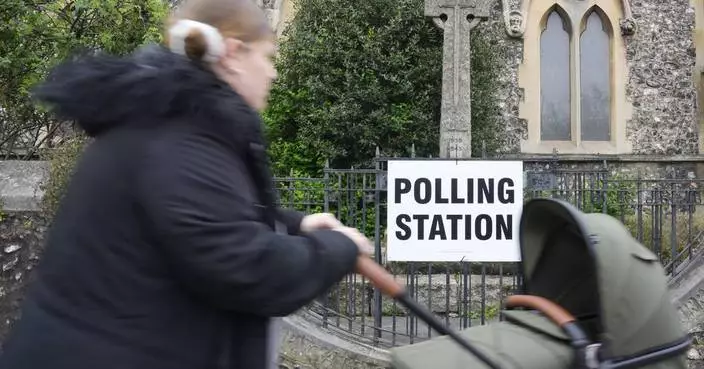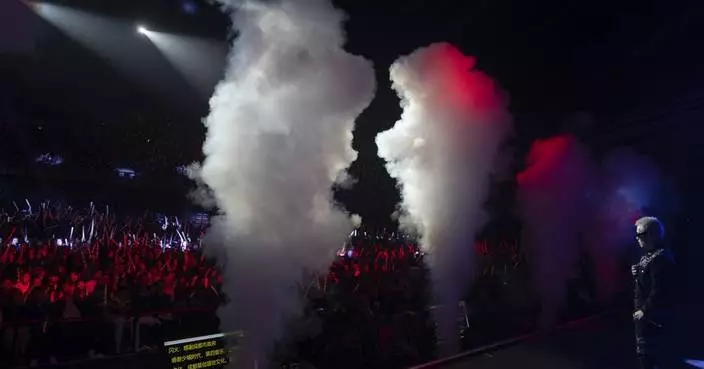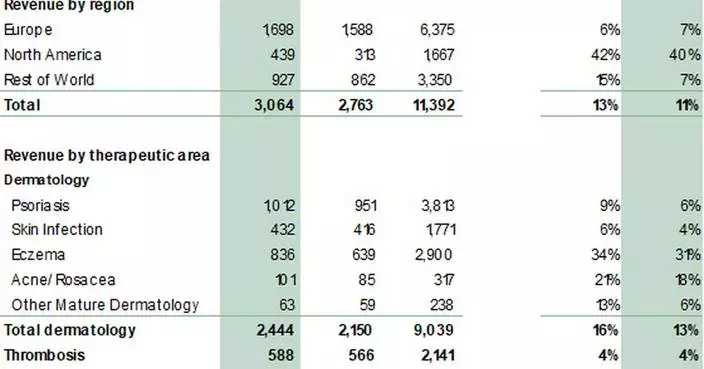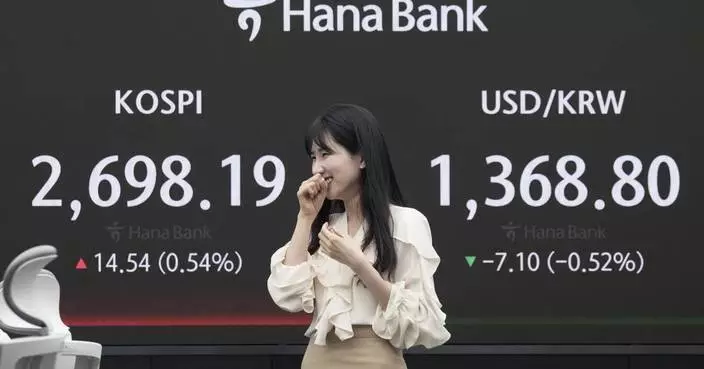NEW YORK--(BUSINESS WIRE)--Apr 11, 2024--
Estée Lauder today announced that it has signed acclaimed Korean singer, songwriter and actress, IU, as its newest Global Brand Ambassador. IU will be Estée Lauder’s first Korean Global Brand Ambassador and will be featured in campaigns for the brand’s hero franchises, Advanced Night Repair and Double Wear. IU’s first campaign will debut in April 2024. IU joins the current roster of Estée Lauder Global Ambassadors, including Ana de Armas, Amanda Gorman, Bianca Brandolini D’Adda, Carolyn Murphy, Grace Elizabeth, Imaan Hammam, Karlie Kloss, Manushi Chhillar and Yang Mi.
This press release features multimedia. View the full release here: https://www.businesswire.com/news/home/20240411412295/en/
Estée Lauder Signs Korean Singer and Actress IU as New Global Brand Ambassador (Photo: Business Wire)
“We are thrilled to welcome IU as Estée Lauder’s newest Global Brand Ambassador,” said Justin Boxford, Global Brand President, Estée Lauder. “IU is one of the most influential artists of her time. She has been able to connect with her fans around the world in such a deep and meaningful way through her music and her extraordinary social media presence. We’re excited to collaborate with such a talented and inspiring artist whose relevancy and far-reaching popularity will allow us to connect with a new generation of consumers in Asia and around the world.”
“I am incredibly excited to be joining Estée Lauder,” said IU. “It is an iconic brand founded by an inspirational woman leader and is beloved by so many women around the world. I am truly honored to be part of it.”
“Over the past 16 years, IU has been a pioneer in every aspect of her career, inspiring fans around the world with her talent, passion, and dedication. Beyond her star power, it’s her sense of purpose and commitment to giving back to others that deeply connects with our brand’s core values,” said Kyumoon Lee, Senior Vice President/General Manager, Estée Lauder Asia Pacific.
About IU
IU is a South Korean singer, songwriter, actress, and philanthropist. With a career of more than 16 years, IU is one of the most popular and beloved artists in Korea and across Asia. To date, she has released 6 studio albums, 9 EP’s, and has debuted over 30 singles including drama O.S.Ts. She is also known worldwide for her acting in TV dramas and movies, including Broker, Hotel del Luna, My Mister, and more. As a multi-talented artist, IU has inspired fans across generations with her lyrics, voice and authenticity. She also has made unwavering commitments to charity, dedicating herself to various philanthropic causes and inspiring other artists in the industry to follow suit. As of February 2024, IU has released a new album, The Winning, and has embarked on her first world tour across Asia, Europe and North America.
About Estée Lauder
Estée Lauder is the flagship brand of The Estée Lauder Companies Inc. Founded by Estée Lauder, one of the world’s first female entrepreneurs, the brand today continues her legacy of creating the most innovative, sophisticated, high-performance skincare and makeup products and iconic fragrances – all infused with a deep understanding of women’s needs and desires. Today, Estée Lauder engages with consumers in over 150 countries around the world and at dozens of touch points – from in-store to digital. And each of these relationships consistently reflects Estée’s powerful and authentic point of view.
NYSE: EL
ELC-B
The military defector was killed in a hail of gunfire and then run over by a car in Spain. The opposition figure was struck repeatedly with a hammer in Lithuania. The journalist fell ill from a suspected poisoning in Germany.
Since President Vladimir Putin launched his invasion of Ukraine, attacks and harassment of Russians — prominent or not — have been blamed on Moscow's intelligence operatives across Europe and elsewhere.
Despite attempts by Western governments to dismantle Russian spy networks, experts say the Kremlin apparently is still able to pursue those it perceives as traitors abroad in an attempt to silence dissent. Opponents of Putin increasingly fear the long arm of Moscow’s security services, including in countries they once thought were safe.
“We just escaped Russia and had this illusion that we’ve escaped prison,” said journalist Irina Dolinina, who works for the independent outlet Important Stories, based in the Czech capital of Prague.
Dolinina and colleague Alesya Marokhovskaya were harassed in 2023, leading to fears they were under surveillance. They were sent threatening messages via comments on the media outlet's website and told not to travel to a conference in Sweden. To underscore the point, the threat included their airline ticket numbers, seat locations and hotel booking.
“It was a mistake for us to think that here, we are safe,” Dolinina told The Associated Press.
The Kremlin, which routinely denies going after its opponents abroad, has been blamed for decades for such attacks.
The most famous cases include Soviet revolutionary-turned-exiled dissident Leon Trotsky, who was killed in 1940 in Mexico after being attacked with an ice ax by a Soviet agent, and Georgi Markov, a dissident working for the BBC's Bulgarian language service, who died in 1978 in London after being jabbed with a poison-tipped umbrella.
Britain was the site of other poisonings blamed on Russian security services under Putin. Defector and former intelligence officer Alexander Litvinenko died after drinking tea laced with radioactive polonium-210 in 2006, and former spy Sergei Skripal and his daughter fell gravely ill but recovered following an attack with a Soviet-era nerve agent in 2018. The Kremlin repeatedly denied involvement in the British cases.
Now, with a full-scale domestic crackdown underway inside Russia, most of the Kremlin's political opponents, independent journalists and activists have moved abroad. There are strong suspicions, as well as accusations from officials, that Moscow is increasingly targeting them.
The breadth of those individuals pursued by Russia, “even if they look and sound completely insignificant,” is because Russian authorities believe they “might come back to the country and destroy it completely,” said security expert Andrei Soldatov.
There are multiple reports of exiles being persecuted not only in former Soviet countries with a large Russian diaspora but also in Europe and beyond.
Activists and independent journalists have reported symptoms that they suspect to be poisoning.
Investigative journalist Elena Kostyuchenko fell ill on a train from Munich to Berlin in 2022, and German prosecutors later said they were investigating it as an attempted killing.
Natalia Arno, the head of the U.S.-based Free Russia Foundation, told AP she still suffers from nerve damage after a suspected poisoning in Prague in May. She believes Russian security services tried to “silence” her because of her pro-democracy work.
In an especially brutal incident, the bullet-riddled body of pilot Maksim Kuzminov was found in La Cala, Spain, near the eastern port of Alicante, after being shot and run over with a car. Threats against him surfaced soon after he stole a Russian Mi-8 helicopter in August, flew it to Ukraine and defected.
Kuzminov, 33, became a “moral corpse” the moment he planned his “dirty and terrible crime,” said Sergei Naryshkin, head of Russia’s foreign intelligence service.
In March, Leonid Volkov, chief of staff to the late opposition politician Alexei Navalny, had his arm broken in a hammer attack in the Lithuanian capital Vilnius.
Lithuania's security service said the assault was probably “Russian-organized and implemented." On April 19, Polish police detained two people on suspicion of attacking Volkov on the orders of a foreign intelligence service.
In the decades Putin has held power, the Kremlin has denied multiple times that it is targeting its enemies at home and abroad. It has not commented on the suspected poisonings and Putin's spokesman, Dmitry Peskov, declined comment on Volkov's case, saying it was a matter for Lithuania's Interior Ministry.
Even fledgling anti-war groups find themselves in Moscow's sights.
Russians in Stockholm, Sweden, who in May 2022 formed one of the first organizations to support Ukraine and political prisoners, burned an effigy of Putin labeled “war criminal” outside the Russian Embassy.
Six months later, Russian authorities designated the group an undesirable organization, threatening members with fines and prison. Their relatives were visited at home in Russia by police, and their personal data was leaked, members told AP, speaking on condition of anonymity because of fears for their security.
The Russian Orthodox Tsargrad media outlet suggested the group’s members could be recruited by foreign intelligence services and dubbed them “terrorists.” The pro-Kremlin outlet warned them of a nasty surprise if they continued opposing the war.
Days later, while visiting relatives in St. Petersburg, a group member named Marina said a police car stopped right in front of her as she exited a shop. Three men got out, asked for her documents, forced her into the car and drove to a police station, siren blaring.
“It was really scary. How the hell did they know my exact location?” Marina told AP, declining to give her surname because she fears for her safety.
She was confronted with the leaked data and video of the embassy protest, and investigators demanded she identify other members of the group, reveal its funding source and asked her views on the war. One even questioned why she was leaving Russia before her father’s birthday -– making clear they knew the identity of her family.
She was charged with an administrative violation, usually punishable by a fine. As police prepared to drive her to her parents’ apartment, it was suggested she “cooperate” and become an informant if she wanted to see her family again without fear of detention, Marina said.
“It’s a known modus operandi for Russian intelligence and the Russian regime to follow opponents in the Russian diaspora in other countries and subject them to different types of harassment or intelligence work,” Fredrik Hultgren-Friberg, spokesperson for the Swedish Security Service, told AP.
Soldatov said the Kremlin is going after a wide range of opponents because it fears pro-Western uprisings like those in Georgia and Ukraine and wants to prevent the seeds of dissent from growing into “something new.”
Even though Western countries expelled hundreds of Russian spies in coordinated actions after the 2018 poisoning of the Skripals and the 2022 invasion of Ukraine, Russians abroad say they are concerned Moscow still can reach them.
Marokhovskaya, the investigative journalist in Prague, received anonymous threats, including one indicating close surveillance that said, “We’ll find her wherever she walks her wheezing dog.”
She and Dolinina told AP they experienced such observation inside Russia, including after publishing award-winning investigations of corruption in Putin’s family.
After moving to Europe, Dolinina said she initially thought she was experiencing “constant paranoia.” When she got the anonymous threats and was followed on Prague's streets, however, she realized the fears were well-founded.
Neither journalist has concrete proof that Russian security services targeted them, but they said they believe the personal data -– flight information, passport numbers and home addresses -– and physical surveillance were likely orchestrated by a state actor.
“I was really shocked that it’s happening in Europe,” Dolinina said.
Although the many incidents the West blames on the Kremlin fuel speculation that Moscow still can intimidate Russians abroad, not everyone has been silenced.
“This is not the reason to quit,“ Marokhovskaya said. "It’s the reason to keep working.”

FILE - Russian defector Maksim Kuzminov attends a news conference in Kyiv, Ukraine, on Tuesday, Sept. 5, 2023. Spanish police say the bullet-riddled body of a man found in a Spanish town was that of Kuzminov, 33, who flew a Russian military helicopter across the front lines into Ukraine last year. Sergei Naryshkin, head of Russia's foreign intelligence service, said Kuzminov became a "moral corpse" from the moment he planned his "dirty and terrible crime." (AP Photo/Vladyslav Musiienko, File)

FILE - Leonid Volkov, chief of staff for the late Russian opposition leader Alexei Navalny watches a session of the European Parliament in Strasbourg, France, on Dec. 15, 2021. Volkov had his arm broken by an attacker wielding a hammer in Vilnius, Lithuania, in March. Lithuania's security service said the assault was probably "Russian-organized and implemented." (AP Photo/Jean-Francois Badias, File)

FILE - Yulia Skripal poses during an interview in London, on Wednesday, May 23, 2018. She and her father, Sergei Skripal, were found slumped on a bench in Salisbury, England, in March 2018. Sergei Skripal lived there after being released from prison in Russia in a spy swap. British investigators said they had been poisoned with a Russian-developed nerve agent and blamed Moscow for the attack. Moscow denied the allegations. (Dylan Martinez/Pool via AP, File)

FILE - Police officers guard a supermarket parking facility near where former spy and defector Sergei Skripal and his daughter were found critically ill following exposure to the Russian-developed nerve agent Novichok in Salisbury, England, on Tuesday, March 13, 2018. The British government accused Russia of attempted murder in the poisonings. Two men identified by authorities as carrying out the attack denied any involvement and told Russian television they were simply tourists. (AP Photo/Matt Dunham, File)

FILE – Russian defector Alexander Litvinenko, a former operative for the KGB and FSB, is seen at his home in London, on Friday, May 10, 2002. Litvinenko was viewed as a traitor by the Kremlin after fleeing to Britain in 2000. He died after drinking tea laced with radioactive polonium-210 at a hotel in London. On his deathbed, Litvinenko claimed that Russian President Vladimir Putin directly ordered his assassination. A British inquiry later found that Russian agents had killed Litvinenko, probably with Putin's approval. (AP Photo/Alistair Fuller, File)














